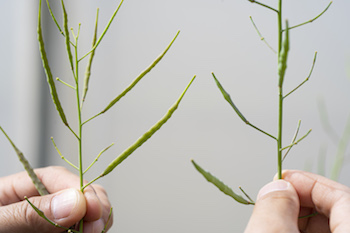Identifying canola germplasm that possess heat tolerance, including associated traits, is the aim of a five-year GRDC research project now underway, with field trials planted in New South Wales and Western Australia in 2020.
The long-term objective is to provide heat-tolerant germplasm to plant breeders, to incorporate into new commercial varieties and help the industry maintain productivity as mean temperatures rise.
The lead researcher, Dr Sheng Chen at the University of Western Australia (UWA) Institute of Agriculture, says heat stress has been identified as an issue of increasing concern globally, with average temperatures projected to rise in coming decades.
Canola is particularly sensitive to high temperature stress. Previous research at UWA has identified that temperatures of more than 30°C during flowering reduce seed yield. With the current canola varieties grown in Australia, losses could be as much as 300 kilograms per hectare for every 1°C increase in mean daily temperature at flowering.
Dr Chen says drought and high temperatures often occur in combination, putting dual stress on plants, which makes it difficult to separate the combined influences in the field. However, the genes that influence a plant’s ability to withstand water stress are different to those that make them heat-tolerant.
His project looks specifically at the genetics of heat tolerance in canola, which is Australia’s third-most economically important crop. It aims to separate out the heat-tolerance genes initially through the use of controlled-temperature experiments, which will screen 200 canola lines a year at UWA in a search for heat-tolerant germplasm.
Selected germplasm from preliminary screening in controlled-environment rooms (CERs) at UWA will be validated for heat tolerance in the field by the NSW Department of Primary Industries (DPI) using portable heat chambers and in irrigated field trials in eastern and Western Australia. Supplemental irrigation is a crucial component of the research to remove the otherwise confounding effects of plant responses to water stress.
The first year of the project, 2019, was spent developing research protocols and criteria to assess heat stress and building the facilities needed to conduct trials. These include two new CERs adjacent to screen houses at UWA’s Shenton Park Field Station, and eight portable heat chambers at the DPI Wagga Wagga Agricultural Institute.
NSW DPI is one of five project partners, along with GRDC, UWA, the Western Australian Department of Primary Industries and Regional Development, and the western node of the Statistics for the Australian Grains Industry group (SAGI West), which is based at Curtin University, NSW.
Testing protocols
To screen germplasm at UWA, control group plants will be placed in one CER, which is set to a maximum daytime temperature of 25°C and an overnight minimum of 15°C during critical growth periods (researchers call this the “cool room”). In the second CER (the “hot room”), plants are subjected to a temperature of 32°C from midday for four hours, with an overnight minimum temperature of 22°C.
This day-night temperature combination was selected after testing the response of canola plants at flowering stage to five different temperature combinations. Dr Chen says experiments to establish these screening protocols found that just three days of high-temperature treatment is enough to produce significant heat stress that reduces canola yields.

Improved heat tolerance could be incorporated into commercial canola varieties within the next few years. Photo: Evan Collis
The research team has also assessed six different week-long periods during the reproductive developmental stage of plants to identify when heat stress has the most impact. The critical periods were identified as the week before the first open flower appears, and the following two weeks.
The initial screening in 2019 used 24 canola genotypes assessed under moderate and high heat stress conditions in the CERs at UWA. This revealed a high genotypic variation for heat stress tolerance among the lines tested.
Those which showed good heat tolerance were selected for the 2020 field trials, with off-season breeding undertaken in Chile to increase the quantity of seed for the time-of-sowing field trials this year.
NSW DPI also built and tested eight new portable heat chambers in field experiments at Wagga Wagga last year. These allow plants within the 4.5-square-metre chambers to be exposed to higher temperatures of 34°C to 35°C for five hours over one week.
A small field trial at Geraldton in WA tested a subset of eight canola genotypes, contrasting heat tolerance under irrigated field conditions in 2019, and helping to establish the framework for larger field trials underway this year.
2020 trials
In addition to the 200 lines being screened at UWA this year, 30 genotypes will be evaluated in time-of-sowing trials underway at three heat-prone sites: Leeton and Narrabri in NSW and Merredin in WA. The work in NSW is led by Dr Rajneet Uppal from the NSW Department of Primary Industries.
This project is drawing on GRDC’s long-standing international canola collaboration with India and China (UM00045) to source germplasm. Dr Chen expects about 300 lines from international sources, including resynthesised B. napus, to be evaluated along with current commercial and historic varieties.
In the initial screening project last year, four lines, derived from germplasm that originated from the international canola collaboration, together with the commercial variety ATR-Stingray, performed well against the heat stress tolerance index on seed yield.
Dr Chen says if germplasm for a high-yielding, heat-tolerant variety can be quickly identified and passed on to plant breeders, improved heat tolerance could be incorporated into new commercial varieties within a few years. However, if heat-tolerant germplasm are identified in lower-yielding lines, it would take longer to combine the trait in higher-yielding germplasm.
Analysis of the results from the harvest of the 2020 trials are expected to be complete by March 2021 and will guide the selection of lines for future trials.
More information: Dr Sheng Chen, sheng.chen@uwa.edu.au; Dr Rajneet Uppal, rajneet.uppal@dpi.nsw.gov.au

























































